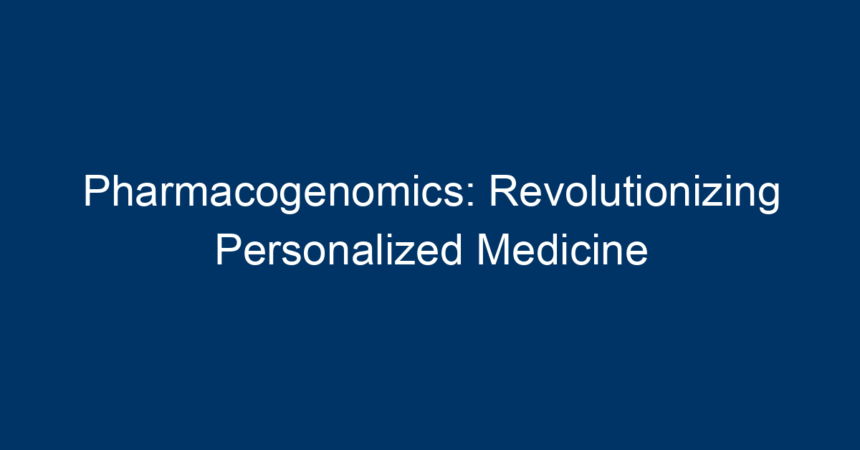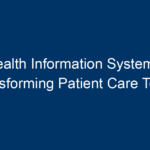In recent years, the field of medicine has witnessed remarkable advancements, yet none as transformative as pharmacogenomics. This branch of personalized medicine focuses on how an individual’s genetic makeup influences their response to medications. As we delve into the intricacies of pharmacogenomics, its potential to revolutionize patient care and enhance therapeutic outcomes will become evident.
Understanding Pharmacogenomics
Pharmacogenomics merges pharmacology—the study of drugs—and genomics, the study of the genome. By analyzing how genes affect a person’s response to drugs, pharmacogenomics allows medical professionals to tailor treatments to individual patients, increasing the effectiveness of medications while minimizing adverse reactions.
The Basics of Genetic Influence on Drug Response
Did you know that certain individuals can metabolize a drug much faster or slower than others? This variation is due to genetic polymorphisms—small changes in DNA that can affect how particular genes function. For instance, a genetic variant in the cytochrome P450 2D6 gene can significantly influence how a patient metabolizes certain antidepressants, leading to different levels of effectiveness and side effects.
The Science Behind Pharmacogenomics
Researchers employ various techniques, including genome-wide association studies (GWAS), to explore the relationships between genetic variations and drug responses. By identifying specific gene variations associated with drug efficacy and safety, pharmacogenomics paves the way for personalized therapeutic strategies, ensuring that the right drug is administered at the right dose.
The Impact of Pharmacogenomics on Personalized Medicine
Enhancing Drug Efficacy
One of the significant promises of pharmacogenomics is its potential to enhance drug efficacy. For example, in cancer treatment, certain genetic markers can predict how well a drug will work for a specific tumor type. Tailoring chemotherapy based on pharmacogenomic data can lead to better outcomes, reducing the trial-and-error approach frequently used in oncology.
Reducing Adverse Drug Reactions
Adverse drug reactions (ADRs) can lead to serious health complications and are a common concern in healthcare. Pharmacogenomics plays a pivotal role in predicting which patients are likely to experience ADRs, thereby enabling healthcare providers to adjust medication regimens proactively. For instance, the clopidogrel case illustrates how genetic testing can determine who may not respond effectively to this antiplatelet medication due to specific genetic variants.
Improving Medication Adherence
When patients receive personalized treatment plans tailored to their genetic profiles, it fosters greater trust and confidence in their therapies. When individuals understand why certain medications work for them—or why others do not—they are more likely to adhere to their prescribed regimens, leading to improved health outcomes.
Current Applications of Pharmacogenomics
Cardiovascular Diseases
In cardiovascular medicine, pharmacogenomics is increasingly playing a role in optimizing drug therapy. Genetic testing for variants like those in the CYP2C19 gene can determine the most effective antiplatelet therapy after heart attacks or stent placement, ensuring patients receive the right medication.
Psychiatry
The field of psychiatry has seen a surge in pharmacogenomic applications, particularly concerning antidepressants. Genetic tests can help identify which patients are likely to benefit from specific medications, reducing the time to find an effective treatment.
Rheumatology
In managing autoimmune diseases, pharmacogenomics can help tailor biologic therapies to individuals based on their genetic profiles, enhancing treatment efficacy while minimizing side effects.
The Challenges of Pharmacogenomics
Cost and Accessibility
Despite its benefits, the high costs associated with genetic testing and the interpretation of results can be a significant barrier. While prices are decreasing, not every healthcare provider or insurance plan covers pharmacogenomic testing, which limits access for many patients.
Ethical Considerations
The ethical implications surrounding pharmacogenomics cannot be ignored. Concerns about privacy and potential discrimination based on genetic information create a need for robust regulations governing genetic data usage in healthcare.
Integration into Clinical Practice
Integrating pharmacogenomics into everyday clinical practice poses a challenge. Medical professionals require training to interpret genetic testing results and incorporate them into treatment plans effectively. Establishing standardized guidelines and educational resources is essential for success.
Future Trends in Pharmacogenomics
Advancements in Technology
As technology continues to evolve, the cost of genomic testing is expected to decrease, making it more widely accessible. Advancements in sequencing techniques, such as next-generation sequencing (NGS), will enable clinicians to gather comprehensive genetic information quickly and effectively.
Population Genetics
Understanding the genetic diversity of populations can inform pharmacogenomic research, leading to more tailored therapies. Research that includes diverse populations enhances our understanding of drug responses across different ethnic groups, ensuring equitable healthcare for all.
Collaborative Research
Future developments in pharmacogenomics will rely on collaborative efforts between researchers, clinicians, and pharmaceutical companies. By sharing data and findings, stakeholders can accelerate the discovery of new pharmacogenomic markers and the development of personalized therapies.
Actionable Insights
-
Stay Informed: For healthcare providers, staying updated on the latest pharmacogenomic studies is essential. Participate in workshops and training programs to enhance your understanding of how genetics can impact drug therapy.
-
Encourage Testing: Patients should be informed about the potential benefits of pharmacogenomic testing. Discuss the option during consultations to personalize their treatment plans further.
-
Advocate for Policies: Support initiatives that aim to lower the costs of genetic testing and improve insurance coverage. Encourage healthcare systems to implement pharmacogenomics into clinical practice.
-
Emphasize Education: Advocate for genetic literacy among patients. Providing quality educational resources can empower patients to engage in their health decisions actively.
- Embrace Technology: As pharmacogenomics continues to gain traction, investing in the latest genomic technologies will enhance the ability to offer personalized medicine solutions.
Conclusion
Pharmacogenomics is not just a passing trend; it is a revolution in how we approach medicine. By understanding genetic variations in patients, healthcare providers can tailor drug therapies to maximize efficacy and minimize side effects. However, challenges remain in terms of cost, accessibility, and ethical considerations. As technology advances and the field evolves, the future of personalized medicine looks promising. Embracing pharmacogenomics not only enhances patient care but also sets the stage for a new era where medicine is truly personalized. Engaging healthcare professionals, patients, and policymakers will be instrumental in realizing the full potential of pharmacogenomics in revolutionizing personalized medicine.




